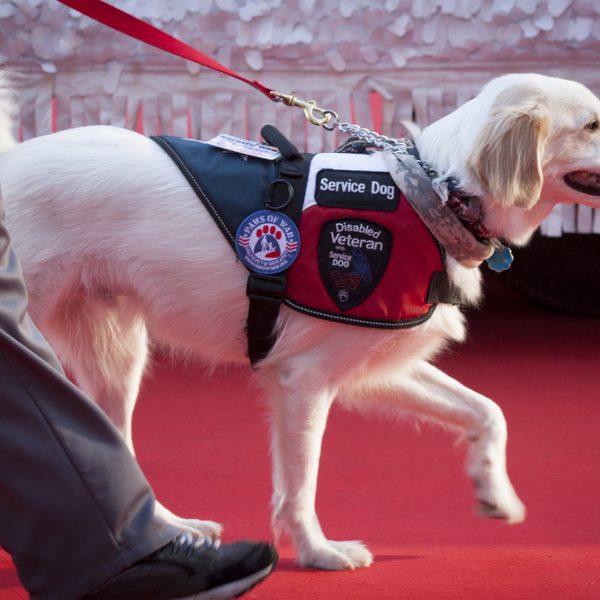Service Dog Etiquette
 If you’re like many people, when you pass any dog on the street, you immediately want to be friendly—to go up and pet it, learn its name, say “Hi.” But what do you do when you see a service dog? Many people don’t know exactly what to do, and may feel awkward “playing” or being friendly with a working dog. As it turns out, these instincts are right, and there is a service dog etiquette to follow. Here is some service dog etiquette to keep in mind:
If you’re like many people, when you pass any dog on the street, you immediately want to be friendly—to go up and pet it, learn its name, say “Hi.” But what do you do when you see a service dog? Many people don’t know exactly what to do, and may feel awkward “playing” or being friendly with a working dog. As it turns out, these instincts are right, and there is a service dog etiquette to follow. Here is some service dog etiquette to keep in mind:
1. Do Not Do Anything to Distract the Service Dog: They’re Working!
Service dogs have an important job to do. That means they need to focus—on their handler, the person they are helping, and on what they are doing with or for their handler.
Distracting them takes away from this effort. Even worse, distracting someone’s service dog can put them in danger. Although service dogs have been thoroughly trained, they can succumb to distractions and bad habits.
So, don’t wave to service dogs, don’t try to talk to them or make sounds at them, and do not pet the dog, especially without asking permission. If you have small children with you, talk to them about leaving service dogs alone and don’t allow them to walk up to one.
2. Don’t Offer Food to a Service Dog
Obviously, food can be a big distraction for dogs. Giving a service dog food presents the added risk of the possibility that it might make the dog sick. Since service dogs help people to be independent, putting a service dog out of commission for any period of time will take away the handler’s independence, as well as potentially giving them anxiety and harming their well-being. If you do something to distract or harm a service dog and its handler is subsequently injured, keep in mind that any injury to the handler is essentially your fault.
3. Don’t Make Personal Inquiries About the Handler’s Illness or Disability
People who have service dogs need them for a reason, but that is none of anyone else’s business. So, don’t use a service dog as a conversation starter. Chances are, the handler wants to keep his or her medical issues private.
Also, per the ADA, it is illegal to ask about it in some cases. For example, as a business owner or employee, you can ask about what work or task the service dog has been trained to do, but you cannot ask about the person’s disability.
4. Don’t Ask for a Demonstration of the Service Dog’s Skills
Service dogs exist because people need help with activities in their daily lives. They play very important roles in helping people with disabilities maintain or regain their independence.
Treating a service dog like it’s there for your entertainment or amusement is just plain rude and disrespectful to the handler. Also, handlers don’t appreciate being told that you “wish you could have a service dog”. People may love their service dogs, but would rather not need the help of a service dog.
5. Know That Service Dogs Are Treated Well
Don’t tell the handler of a service dog that you feel sorry for the dog. Know that service dogs have good lives. Just like regular “pet” dogs, they get love and affection, playtime, and good food to eat.
They may be working when out in public with their handlers, and that’s why it’s so important not to distract them, but, at home, they get time to relax. Plus, many of them are working dogs that are happiest when they have a job to do.
This is some basic service dog etiquette to keep in mind the next time you see a service dog while you are out and about.
